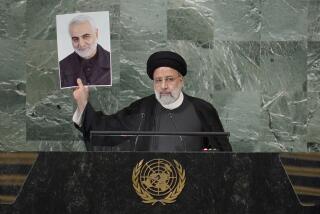Gulf Crisis: Put Out More Flags : Keeping the ‘Ugly American’ from getting uglier
- Share via
Iraq’s conquest of Kuwait represents the most flagrant challenge to world peace and economic order since the late 1930s. It is an international threat that demands a truly international response. The U.N. Security Council has taken an unequivocal political stance, condemning Iraq, demanding its withdrawal from Kuwait, pronouncing null and void its claimed annexation. Scores of nations have separately voiced condemnation.
An international show of military support for the political goals expressed by the Security Council would be of enormous help. It’s true that with French and British forces joining what is fast becoming a considerable American armed presence in and near the Persian Gulf, the determination and the wherewithal to resist further Iraqi aggression grow more credible by the hour. All this is welcome, for the stakes involved in safeguarding the area’s oil resources are enormous. What’s needed are more flags in the gulf.
MULTINATIONALISM: The Soviet Union, for one, says that it might be prepared to contribute to a U.N.-sponsored military intervention in the gulf. Other nations might similarly be willing to commit their forces under those auspices. The Security Council can recommend such a course. None of this would interfere with what the United States and Saudi Arabia are already doing. The U.N. Charter clearly recognizes the right of individual and collective self-defense. International forces operating under U.N. sanction would simply provide another layer of resolve.
The nervous and xenophobic Saudis aren’t likely to invite any more foreigners onto their territory except, possibly, token contingents from other Muslim countries. That’s no problem. While help from other countries would be welcomed, the main point of visibly broadening the anti-Iraq military coalition is political, to try to dilute the all-Western nature of the intervening forces.
ARAB SENSITIVITIES: The Arab world, not least those regimes usually described as moderate and friendly, grows agitated and alarmed whenever American or other Western military power is projected into the region.
That’s most often explained by Arab objections to the close U.S. relationship with Israel, and by bitter and humiliating memories of Western colonial occupations of the recent past. The historical roots, of course, run far deeper than that. Islam and the Western world have had an uneasy and often confrontational relationship since the 9th Century. Suspicions and dislike of America and the West remain high. That fact of international life does not mean that Western countries must subordinate their vital interests to Arab concerns. But it does point up the political and psychological value of trying to give a less Western caste to the anti-Iraq coalition.
Even token help from Pakistan, Turkey and the Arab states would be particularly helpful. President Bush wasn’t just being rhetorical. This is not a U.S.-Iraq confrontation, but it is indeed one that affects the entire world, and that calls for a global response.
More to Read
Sign up for Essential California
The most important California stories and recommendations in your inbox every morning.
You may occasionally receive promotional content from the Los Angeles Times.













